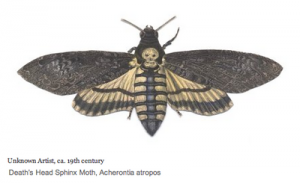Archive: Author: Hannah
Selected Shorts: Silverwater
 One of my favorite short stories is on Selected Shorts this week: “Silverwater” by Amy Bloom (performed by the great Linda Lavin). I first read this story in the 1992 edition of Best American Short Stories (a banner year for short fiction—the book also includes “Emergency” by Denis Johnson, “The Pugilist at Rest” by Thom Jones, “Carried Away” by Alice Munro, and “A Good Scent from a Strange Mountain” by Robert Olen Butler). “Silverwater” is about a family trying to cope with their daughter Rose’s schizophrenia. Told from the point of view of Rose’s sister, Violet, the narration arcs across her illness, from the first manifestations to the tragic conclusion, without ever losing its sense of humor or humanity. Here are the opening lines:
One of my favorite short stories is on Selected Shorts this week: “Silverwater” by Amy Bloom (performed by the great Linda Lavin). I first read this story in the 1992 edition of Best American Short Stories (a banner year for short fiction—the book also includes “Emergency” by Denis Johnson, “The Pugilist at Rest” by Thom Jones, “Carried Away” by Alice Munro, and “A Good Scent from a Strange Mountain” by Robert Olen Butler). “Silverwater” is about a family trying to cope with their daughter Rose’s schizophrenia. Told from the point of view of Rose’s sister, Violet, the narration arcs across her illness, from the first manifestations to the tragic conclusion, without ever losing its sense of humor or humanity. Here are the opening lines:
“My sister’s voice was like mountain water in a silver pitcher; the clear, blue beauty of it cools you and lifts you up beyond your heat, beyond your body. After we went to see La Traviata, when she was fourteen and I was twelve, she elbowed me in the parking lot and said, “Check this out.” And she opened her mouth unnaturally wide and her voice came out, so crystalline and bright, that all the departing operagoers stood frozen by their cars, unable to take out their keys or open their doors until she had finished and then they cheered like hell.”
Listen in on your local public radio station, or download it for free on podcast. You’ll also get a wonderful piece: “Love” by Tibor Dery, read by Keir Dullea. I missed posting on last week’s program, which featured “The Fix” by Percival Everett (read by our own Isaiah Sheffer), about a man who can fix anything, from broken toys to broken hearts. This is a story you should not miss—but don’t worry—you can hear both shows right now by going here.
Selected Shorts: Milestones
 Milestones are markers that tell you how far it is from where you’ve come, and how far it is to where you’re going. I’ve been on Selected Shorts for about a year now, and this week’s episode marks where it all began. Back in 2010, the program recorded a story of mine, “Milestones,” read by the amazing Laurie Anderson. Isaiah and Kathy Minton, the producer of Selected Shorts, invited me to WNYC to do an interview about the piece and the rest, I suppose, is history–I was invited to come on board as the show’s literary commentator. I’d written “Milestones” for an anthology, Lit Riffs, which asked authors to contribute pieces of fiction based on music. My story was inspired by one one of my favorite albums, Milestones by Miles Davis. To me the title song, “Milestones,” captures more than any other what it’s like to live in New York–the energy, the rhythm, and the way a person can be separate and then weave back into the crowd–a sense of loneliness as well as belonging. I decided to break the song apart and follow its structure. When the chorus came through, I wrote about a bustling, city street; when John Coltrane and Miles Davis did their solos, I went into the interior lives and memories of the characters. I also used the names of all the musicians in the story: Miles Davis, Julian “Cannonball” Adderley, John Coltrane, Red Garland, Paul Chambers and “Philly” Joe Jones. So listen in on WNYC, your local radio station or on podcast to hear this story of music and memory and also, a milestone: the first recording I ever did with Isaiah Sheffer. In addition, you’ll get to hear “Wunderkind” by Carson McCullers, read by Kelli O’Hara, which focuses on another great piece of music: Ludwig von Beethoven’s Piano Sonata No. 12. And if you’ve never had the pleasure of listening “Milestones,” click on the link below. Hopefully you will hear bits and pieces reflected in the words.
Milestones are markers that tell you how far it is from where you’ve come, and how far it is to where you’re going. I’ve been on Selected Shorts for about a year now, and this week’s episode marks where it all began. Back in 2010, the program recorded a story of mine, “Milestones,” read by the amazing Laurie Anderson. Isaiah and Kathy Minton, the producer of Selected Shorts, invited me to WNYC to do an interview about the piece and the rest, I suppose, is history–I was invited to come on board as the show’s literary commentator. I’d written “Milestones” for an anthology, Lit Riffs, which asked authors to contribute pieces of fiction based on music. My story was inspired by one one of my favorite albums, Milestones by Miles Davis. To me the title song, “Milestones,” captures more than any other what it’s like to live in New York–the energy, the rhythm, and the way a person can be separate and then weave back into the crowd–a sense of loneliness as well as belonging. I decided to break the song apart and follow its structure. When the chorus came through, I wrote about a bustling, city street; when John Coltrane and Miles Davis did their solos, I went into the interior lives and memories of the characters. I also used the names of all the musicians in the story: Miles Davis, Julian “Cannonball” Adderley, John Coltrane, Red Garland, Paul Chambers and “Philly” Joe Jones. So listen in on WNYC, your local radio station or on podcast to hear this story of music and memory and also, a milestone: the first recording I ever did with Isaiah Sheffer. In addition, you’ll get to hear “Wunderkind” by Carson McCullers, read by Kelli O’Hara, which focuses on another great piece of music: Ludwig von Beethoven’s Piano Sonata No. 12. And if you’ve never had the pleasure of listening “Milestones,” click on the link below. Hopefully you will hear bits and pieces reflected in the words.
Selected Shorts: The Propinquity Effect
 There’s a wonderful line in Edgar Allan Poe’s “The Sphinx” (performed this week on Selected Shorts by Kathleen Widdoes): “..the principle source of error in all human investigations lay in the liability of the understanding to under-rate or to over-value the importance of an object, through mere mis-admeasurement of its propinquity.” The object in this case is the Death’s Head Sphinx Moth, which our narrator, haunted by a Cholera epidemic, mistakes as a monstrous omen of death and ruin. Its propinquity (which can mean both a physical and/or spiritual nearness) makes our narrator almost lose his mind. The other stories featured on Selected Shorts this week also examine different results of the “Propinquity Effect”: Krista MacGruder’s “Not Quite Home Alone,” read by Jacqueline Kim; Miranda July’s “The Shared Patio,” read by Kirsten Vangsness; and Richard Ford’s “Privacy,” read by Rene Auberjonois. You can listen in on your local public radio station, or download the podcast for free. And the next time someone or something keeps re-appearing in your life, ask yourself: is the universe trying to tell me something? Or: am I mistaking a moth for a monster?
There’s a wonderful line in Edgar Allan Poe’s “The Sphinx” (performed this week on Selected Shorts by Kathleen Widdoes): “..the principle source of error in all human investigations lay in the liability of the understanding to under-rate or to over-value the importance of an object, through mere mis-admeasurement of its propinquity.” The object in this case is the Death’s Head Sphinx Moth, which our narrator, haunted by a Cholera epidemic, mistakes as a monstrous omen of death and ruin. Its propinquity (which can mean both a physical and/or spiritual nearness) makes our narrator almost lose his mind. The other stories featured on Selected Shorts this week also examine different results of the “Propinquity Effect”: Krista MacGruder’s “Not Quite Home Alone,” read by Jacqueline Kim; Miranda July’s “The Shared Patio,” read by Kirsten Vangsness; and Richard Ford’s “Privacy,” read by Rene Auberjonois. You can listen in on your local public radio station, or download the podcast for free. And the next time someone or something keeps re-appearing in your life, ask yourself: is the universe trying to tell me something? Or: am I mistaking a moth for a monster?
Selected Shorts: Apartment Living
 I once shared an apartment so small I could touch both walls of my bedroom when I stretched out my arms. Our bathroom was so tiny there was no sink. We washed our hands and faces in the kitchen. At the breakfast table, we could open the fridge and pull down the cereal, without getting up from our chairs. It was like living in an elevator, and after a year, my roommate and I realized that we were both having the same dream. In this dream, we would discover a door that opened up to a whole new section of the apartment–spacious, unending rooms full of windows and air and light. But in the morning, when we placed our hands where the door had been, all we could feel was the rumble of our neighbor’s stereo and the cooing of the pigeons that roosted in the walls. Since then, I’ve heard of other New Yorkers having similar fantasies of expanding apartments, and it came to mind as I listened to David Rakoff performing “Quadraturin” by Sigizmund Krzhizhanovsky this week on Selected Shorts, where an 86 square foot room grows and grows, until it becomes so vast the owner gets lost. Following in the theme of tightly packed spaces is “A Woman at the Window,” by James Lasdun, read by Leenya Rideout, where a New York City woman, leaning out her window like Rapunzel, tries to recapture a moment of rescue from her tenement apartment. Finally, we end with “Flight” by Deborah Joy Corey, also read by Leenya Rideout, where a neighbor decides to get a bit too neighborly. You can listen in on your local public radio station, or download this episode on podcast. And be grateful, next time you brush your teeth, that you are doing it in a bathroom, and not over a sink of unwashed dishes.
I once shared an apartment so small I could touch both walls of my bedroom when I stretched out my arms. Our bathroom was so tiny there was no sink. We washed our hands and faces in the kitchen. At the breakfast table, we could open the fridge and pull down the cereal, without getting up from our chairs. It was like living in an elevator, and after a year, my roommate and I realized that we were both having the same dream. In this dream, we would discover a door that opened up to a whole new section of the apartment–spacious, unending rooms full of windows and air and light. But in the morning, when we placed our hands where the door had been, all we could feel was the rumble of our neighbor’s stereo and the cooing of the pigeons that roosted in the walls. Since then, I’ve heard of other New Yorkers having similar fantasies of expanding apartments, and it came to mind as I listened to David Rakoff performing “Quadraturin” by Sigizmund Krzhizhanovsky this week on Selected Shorts, where an 86 square foot room grows and grows, until it becomes so vast the owner gets lost. Following in the theme of tightly packed spaces is “A Woman at the Window,” by James Lasdun, read by Leenya Rideout, where a New York City woman, leaning out her window like Rapunzel, tries to recapture a moment of rescue from her tenement apartment. Finally, we end with “Flight” by Deborah Joy Corey, also read by Leenya Rideout, where a neighbor decides to get a bit too neighborly. You can listen in on your local public radio station, or download this episode on podcast. And be grateful, next time you brush your teeth, that you are doing it in a bathroom, and not over a sink of unwashed dishes.
Selected Shorts: Icebergs
 Roughly, only ten percent of an iceberg can be seen floating above water. The other 90 percent is under the surface—treacherous for boats navigating the frozen seas, but a wonderful metaphor for dark emotions and hidden secrets. We have a special mini-edition podcast of Selected Shorts this week, in honor of the 100th anniversary of the sinking of the Titanic, featuring “Carpathia” by Jesse Lee Kercheval. Kercheval’s beautifully written short-short focuses on a newly married couple, passengers on The Carpathia (one of the ships that picked up survivors from the Titanic), whose experience reveals the tip of their own looming disaster. We also have our regular radio program this week, continuing in the vein of married couples in trouble: Nahid Rachlin’s “Strangers in the House,” read by Freda Foh Shen, and “A Disappearance,” by Julie Otsuka, read by Jane Kaczmarek. There’s also a great interview with Julie Otsuka about her work. You can enjoy this program on the radio or via podcast. In the meantime, keep an eye out for icebergs.
Roughly, only ten percent of an iceberg can be seen floating above water. The other 90 percent is under the surface—treacherous for boats navigating the frozen seas, but a wonderful metaphor for dark emotions and hidden secrets. We have a special mini-edition podcast of Selected Shorts this week, in honor of the 100th anniversary of the sinking of the Titanic, featuring “Carpathia” by Jesse Lee Kercheval. Kercheval’s beautifully written short-short focuses on a newly married couple, passengers on The Carpathia (one of the ships that picked up survivors from the Titanic), whose experience reveals the tip of their own looming disaster. We also have our regular radio program this week, continuing in the vein of married couples in trouble: Nahid Rachlin’s “Strangers in the House,” read by Freda Foh Shen, and “A Disappearance,” by Julie Otsuka, read by Jane Kaczmarek. There’s also a great interview with Julie Otsuka about her work. You can enjoy this program on the radio or via podcast. In the meantime, keep an eye out for icebergs.
Gowanus, pt. 48
Selected Shorts: Why I Am Not Where You Are
 I AM NOT WHERE YOU ARE. Because I am here. It’s the first day of the Sirenland Writers Conference, and students are arriving from all over the world to study writing with Dani Shapiro, Jim Shepard, Susan Orlean, and myself. While I’m away in this strange and beautiful place, there will be some equally strange and beautiful stories on Selected Shorts, the first being Jonathan Safran Foer’s “Why I’m Not Where You Are,” performed by Isaiah Sheffer (an excerpt from his best-selling novel, Extremely Loud and Incredibly Close), followed by two short pieces originally published in The Believer by Will Eno and James Braly (both read by the authors), and ending with “All the Days and Nights,” by William Maxwell, performed by Tony Roberts. Tune in to your local Public Radio station or download the show for free via podcast. And stay true while I’m gone. In one short week, I will be back wherever you are again.
I AM NOT WHERE YOU ARE. Because I am here. It’s the first day of the Sirenland Writers Conference, and students are arriving from all over the world to study writing with Dani Shapiro, Jim Shepard, Susan Orlean, and myself. While I’m away in this strange and beautiful place, there will be some equally strange and beautiful stories on Selected Shorts, the first being Jonathan Safran Foer’s “Why I’m Not Where You Are,” performed by Isaiah Sheffer (an excerpt from his best-selling novel, Extremely Loud and Incredibly Close), followed by two short pieces originally published in The Believer by Will Eno and James Braly (both read by the authors), and ending with “All the Days and Nights,” by William Maxwell, performed by Tony Roberts. Tune in to your local Public Radio station or download the show for free via podcast. And stay true while I’m gone. In one short week, I will be back wherever you are again.
Selected Shorts: Little Green Monsters
 About a year ago, I was walking down Broadway and noticed a giant bug hanging on the door of a building. Normally I dismiss any large insect as some kind of roach. (I have seen NYC cockroaches as big as my own hand.) But the bright green wings of this creature made me stop and investigate. It was an enormous praying mantis, right in the middle of New York City. I picked him up, and his long arms latched onto the skin of my hand. Under the neon lights, the crowds and taxis and buses whizzing past us, he turned his monstrous head and seemed to gaze at me. The strangeness of this encounter came to mind as I listened to our final set of Haruki Murakami stories on Selected Shorts this week. Murakami has a knack for making the ordinary suddenly extraordinary. He does this by focusing on the details. It is in these details that he makes the reader feel unsettled, to see the weirdness in their own lives. A fan of Tolstoy, he once said, “Tolstoy wanted to write the total description; my description is focused on a very small area. When you describe the details of small things, your focus gets closer and closer, and the opposite of Tolstoy happens—it gets more unrealistic. That’s what I want to do.” The objects he focuses on in our first story, “Airplane”—such as the clock and the train—do exactly that—they start to feel strange, even magical (especially with Parker Posey’s wonderfully dramatic reading). The magic continues with “The Mirror,” performed by Campbell Scott, and then gets completely surreal in “The Little Green Monster,” performed by Dana Ivey, where a mythical creature crawls out of the earth to declare his love. You can hear these wild stories and examine the details yourself by listening on podcast or tuning in to your local public radio station. As for my own little green monster, he crawled up and down my arm like a parrot as I carried him across the city. People stopped and stared. A few asked me where I’d found him. “On Broadway,” I said. We continued until we reached central park. And there, deep in a wooded glade, I let him go.
About a year ago, I was walking down Broadway and noticed a giant bug hanging on the door of a building. Normally I dismiss any large insect as some kind of roach. (I have seen NYC cockroaches as big as my own hand.) But the bright green wings of this creature made me stop and investigate. It was an enormous praying mantis, right in the middle of New York City. I picked him up, and his long arms latched onto the skin of my hand. Under the neon lights, the crowds and taxis and buses whizzing past us, he turned his monstrous head and seemed to gaze at me. The strangeness of this encounter came to mind as I listened to our final set of Haruki Murakami stories on Selected Shorts this week. Murakami has a knack for making the ordinary suddenly extraordinary. He does this by focusing on the details. It is in these details that he makes the reader feel unsettled, to see the weirdness in their own lives. A fan of Tolstoy, he once said, “Tolstoy wanted to write the total description; my description is focused on a very small area. When you describe the details of small things, your focus gets closer and closer, and the opposite of Tolstoy happens—it gets more unrealistic. That’s what I want to do.” The objects he focuses on in our first story, “Airplane”—such as the clock and the train—do exactly that—they start to feel strange, even magical (especially with Parker Posey’s wonderfully dramatic reading). The magic continues with “The Mirror,” performed by Campbell Scott, and then gets completely surreal in “The Little Green Monster,” performed by Dana Ivey, where a mythical creature crawls out of the earth to declare his love. You can hear these wild stories and examine the details yourself by listening on podcast or tuning in to your local public radio station. As for my own little green monster, he crawled up and down my arm like a parrot as I carried him across the city. People stopped and stared. A few asked me where I’d found him. “On Broadway,” I said. We continued until we reached central park. And there, deep in a wooded glade, I let him go.


